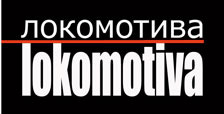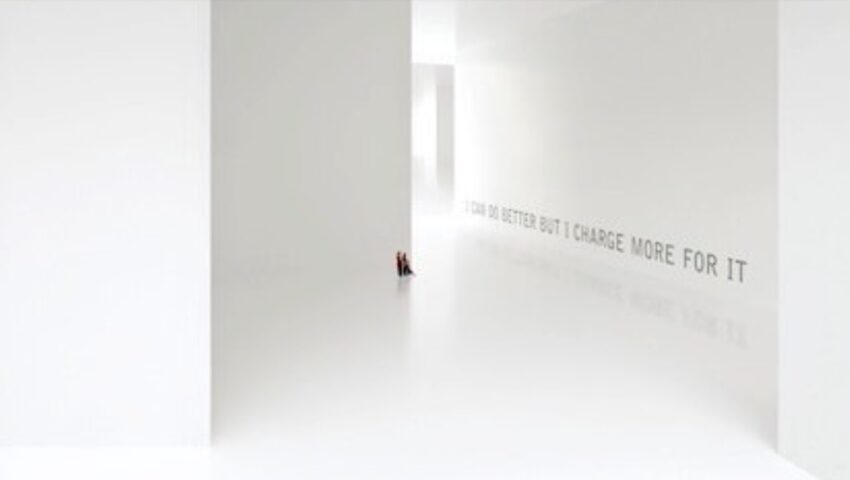(Co)thinking, (co)doing & ongoing (co)questioning: precarious story-sharing
Anka Herbut, Elena Novakovits, Maša Radi Buh
November 3, 2022
Conference of Academies at PAF-Performing Arts Forum
(an encounter on politics and the relevant urgencies within the academic and professional performing arts field initiated by Kunsthøgskolen i Oslo)
28th September – 2nd October 2022, St Erme, France
(Co)thinking, (co)doing & ongoing (co)questioning: precarious story-sharing
Anka Herbut, Elena Novakovits and Masa Radi Buh
(invited to PAF and mentored by Ana Vujanović in the frame of the Critical Practice (Made in YU) program)
Cover image from the serie Espaces Muséaux by Muriel Bordier
Did you ever think that it’s not your fault you can’t count on your account?
Don’t worry, the curator is probably more scared of you than you are of them.
Depression in the context of capitalism is just being intelligent and empathetic.
Feel ok to talk about your unofficial working hours.
Precarity is not your fault, it’s a systemic failure.
You are enough and your worth is not determined by how productive you are.
You don’t have to do all the work.
Dear cultural field,
Back in July, we were in front of our screens – in another zoom meeting – with half of our beloved Critical Practice (Made in YU) group. Different time zones, temperatures, cities, moods and contexts. While discussing our current professional and personal statuses we were diving in some of our (common) concerns, pains, fears, hopes, imaginaries, and failures. Trying to figure out how we could contribute to the PAF gathering scheduled for the end of September. Juggling our recurring dialogues between self-organising, collectivities, new types of communalisation, feminism-ing of education in arts, and various (often fluid) economies (of time) in the performative arts & academia, we noticed that our conversations were getting narrower and narrower starting to more and more revolve around our precarious life-experiences and the ways they affect our accounts, feelings and opportunities. And, thus, an urgent question arose: Who can write and talk about precarity? And almost immediately it was followed by many others – not less urgent – tightly crowded around the initial one… However, they were somehow all born out of our private life-stories that we shared with one another during our talks. Like this one for example: Do we need to experience precarious living to have a right to write about it?
The rule of situated writing applies almost always – as some kind of unwritten law – to identity politics and deters pretty effectively from appropriating someone else’s experience. So why is precarity the only (or at least one of the very few) experience(s) that people write about as if it was a fascinating concept and not a living – often painful and demanding – experience? How do the embodied precariousness and its bitter undertaste shape (and deepen) the way we write about it? And how missing this point in our biography may affect, potentially distance, our writing? So let’s ask once again: Do we need to experience precarious living to have a right to write about it?
If yes, don’t you think it can lead to the not entirely desirable typecasted writings?
If not, don’t you think it can lead to appropriation of experience?
And if not again, how would you justify that answer?
And why is it so easy to theorise precariousness?
And what are our privileges?
In what ways (if at all) are we underprivileged?
In what ways (if at all) are we unprivileged?
What level of precarity does each of us experience and where do we meet in our precariousness?
How & where to gain more agency?
Can we meet there with non-precarious individuals?
If yes, on what basis?
If not, doesn’t this answer and the resulting model of thinking build obstacles in the way of alliances?
Do you think that unless you undergo the same experience as someone else, you know nothing about their experience, aches & pains and should stay silent?
Or do you think that identity switches allow us to become (an)other and build alliances through empathy?
More and more ambivalent thoughts were coming up:
What are the current shapes and areas of precariousness and how do they differ from the previous ones? How precarity transforms and reaches its multiple variants and identities? In what (eco)systems does it grow best? What is the relation between the economic and existential precarity? How are these multiple theories and writings influencing precarious living experience? How we could approach it otherwise, and so on…
Having so many questions, and just as many real-life stories, we decided to develop the workshop with which we seek to broaden the area of precarious experience and open it to/on others, i.e. to give space & voice to a broader range of professionals and students of the cultural sector. To hear and to be heard. We named it Tell me yours, I’ll tell you mine. The precarious story-sharing workshop. And the question we started with, was: How to rethink, reframe, rewrite our embodied precarities?
Yet taking a step back and returning to the PAF gathering itself, we need to mention that we shared this 5-day-experience with students and mentors from the University of Ljubljana Academy of Theatre, the Dramaturgy Department of the Academy of Dramatic Art in Zagreb, SODA/Hzt-Berlin, P.A.R.T.S. in Brussels, Kunsthøgskolen i Oslo, Choreography and Performance in Giessen, and Dance Performance at the Theatre Academy of the University of the Arts Helsinki. Critical Practice (Made in YU) was the only non-institutionalized, unseated initiative based on self-organisation and self-education to such an extent. However, for these few days PAF became a temporary platform that allowed us to learn more about our curricula, our needs and challenges we’re facing under our programs. In order to create a common base and a safe space, where the division between mentors and students could temporarily blur, it was proposed not only to think, talk and work together, but also to collectively engage in cooking, eating, dishwashing, and cleaning. This laid the groundwork for situations in which we could be both equally responsible and engaged in our time spent together.
The situation we – on behalf of Critical Practice (Made in YU) – initiated and proposed to the assembled studying and teaching bodies was at first an open conversation circulating around precarity (beyond theory) and (working) class. And we tried to keep in mind to be conscious of our privilege before we start talking about precarity. And to search for coalitions instead of engaging in precarious olympics…

PAF was the starting (privileged) point…
And then more questions arose, among which the following were reappearing:
How to avoid using the word precarious as a label?
Do we lose working class experience when we’re no longer precarious?
Is motherhood a precarious experience by definition?
What about relations between all the invisible, underpaid or unpaid work and recognition?
What about normalisation of precarity and what we can do with that?
First of all, to find a way out of this maze of questions, we wanted to find partners in crime and build together temporary groups to go on, to survive, to share experiences, and to enhance discours. Tell me yours, I’ll tell you mine. The precarious story-sharing workshop became our platform and our way to forge alliances.
Tell me yours, I’ll tell you mine. The precarious story-sharing workshop has been conceived as an ongoing transnational project that aims to collectively unpack and re-think the term of precarity in the academic and professional sector of the performing arts field through personal narrations. Looking beyond the established theorization of the insecure figure of the student, artist and worker in the cultural field, we open a space to anonymously share and reflect. This trajectory will help us develop our work, expand the discourse through situated knowledge, and share it with others within different encounters and contexts.
But at that point – in PAF – one of the strategies that structured our workshop was the basic dramaturgical tool, i.e. asking questions. One of the variations on this tool was the collective process of multiplying questions by freely answering the question with another question…
Does precarity correspond to a need?
What would be the minimum condition for a decent living that would be possible for the entire world?
Could we agree on one dignity?
Can privileges become standard?
How could it become a standard everywhere?
Can we recognize our own privileges?
What is the relation between precarity & class?
What is the relation between precarity and colonialism?
How can we think about precarity without precarizing others?
What is our agency in our precarious lives?
Are we ashamed of being precarious?
Are we proud of being precarious?
Are we aware of not being precarious?
Can we try harder to collectivise and think against the individual?
Can / do we collectivise differences?
Can we use precarity for class solidarity?
Can we use precarity for solidarity?
These (and many other) questions were born through the collective brainstorming and wouldn’t appear in different conditions because each one of them informed the subsequent and together they created something more than only a sum of consecutive questions. Thus, they were authored by all of us and no one at the same time. Thanks to everyone that was actively there, gave their feedback, time and encouragement to continue. Many many thanks to our partners in crime – the mentioned other half of the Critical Practice (Made in Yu) group – Maeve Johnson, Kasia Wolińska and Jette Büchsenschütz for outside-eying the process and contributing stories! And, to all the other friends, colleagues, unknown comrades for sharing their thoughts, quotes & stories with us. And, of course, to Ana Vujanović for the invitation, inspiration, care and support!

To be continued…
So, dear cultural field, if you’ve somehow become inspired and want to share your own precarious story safely & anonymously, we invite you to fill out this
Thank you for caring,
Anka Herbut, Elena Novakovits, Maša Radi Buh
invited to PAF and mentored by Ana Vujanović
affect, CP4, labor, PAF, precarity, stories, storysharing, workshop, writing

